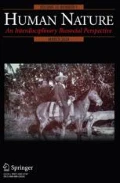Abstract
Theories of religion that are supported with selected examples can be criticized for selection bias. This paper evaluates major evolutionary hypotheses about religion with a random sample of 35 religions drawn from a 16-volume encyclopedia of world religions. The results are supportive of the group-level adaptation hypothesis developed in Darwin’s Cathedral: Evolution, Religion, and the Nature of Society (Wilson 2002). Most religions in the sample have what Durkheim called secular utility. Their otherworldly elements can be largely understood as proximate mechanisms that motivate adaptive behaviors. Jainism, the religion in the sample that initially appeared most challenging to the group-level adaptation hypothesis, is highly supportive upon close examination. The results of the survey are preliminary and should be built upon by a multidisciplinary community as part of a field of evolutionary religious studies.
Similar content being viewed by others
References
Alcorta, Candace, and Richard Sosis 2005 Ritual, Emotion, and Sacred Symbols: The Evolution of Religion as an Adaptive Complex. Human Nature 16:323–359.
Alexander, R. D. 1987 The Biology of Moral Systems. New York: Aldine de Gruyter.
Atran, S. 2002 In Gods We Trust: The Evolutionary Landscape of Religion. Oxford: Oxford University Press.
Atran, S., and A. Norenzayan 2004 Religion’s Evolutionary Landscape: Counterintuition, Commitment, Compassion, Communion. Behavioral and Brain Sciences 27:713–730.
Aunger, R. 2002 The Electric Meme. New York: Free Press.
Blackmore, S. 1999 The Meme Machine. Oxford: Oxford University Press.
Bowles, S., and H. Gintis 2003 Origins of Human Cooperation. In Genetic and Cultural Evolution of Cooperation, P. Hammerstein, ed. Pp. 429–444. Cambridge: MIT Press
Boyer, P. 2001 Religion Explained. New York: Basic Books.
Bulbulia, J. 2004 The Cognitive and Evolutionary Psychology of Religion. Biology and Philosophy 19:655–686.
Campbell, B. F. 1993 Ancient Wisdom Revised. Princeton: Princeton University Press.
Cousins, N. 1958 In God We Trust: The Religious Beliefs and Ideas of the American Founding Fathers. New York: Harper.
Cronk, L. 1994 The Use of Moralistic Statements in Social Manipulation: A Reply to Roy A. Rappaport. Zygon 29:351–355.
Dawkins, R. 1976 The Selfish Gene. Oxford: Oxford University Press.
Durkheim, E. 1995 The Elementary Forms of Religious Life. New York: Free Press. (Originally published in 1912)
Eliade, M., ed. 1987 The Encylopedia of Religion. New York: Macmillan.
Endler, J. A. 1995 Multiple-Trait Coevolution and Environmental Gradients in Guppies. Trends in Ecology and Evolution 10:22–29.
Guthrie, S. E. 1995 Faces in the Clouds: A New Theory of Religion. Oxford: Oxford University Press.
Hammerstein, P., ed. 2003 Genetic and Cultural Evolution of Cooperation. Cambridge: MIT Press.
Henrich, J. 2004 Cultural Group Selection, Coevolutionary Processes, and Large-Scale Cooperation. Journal of Economic Behavior and Organization 53:3–35.
Heyd, U. 1950 Foundations of Turkish Nationalism: The Life and Teachings of Ziya Gokalp. London: Harvill Press.
Hilkert, M. C. 2001 Speaking with Authority: Catherine of Siena and the Voices of Women Today. New York: Paulist Press.
Hinde, R. 1999 Why Gods Persist: A Scientific Approach to Religion. New Brunswick, N.J.: Routledge.
Ingle, H. L. 1994 First among Friends: George Fox and the Creation of Quakerism. New York: Clarendon
Irons, W. 2001 Religion as a Hard-to-Fake Sign of Commitment. In Evolution and the Capacity for Commitment, R. Nesse, ed. Pp. 292–309. New York: Russell Sage Foundation.
Laidlaw, J. 1995 Riches and Renunciation: Religion, Economy and Society among the Jains. Oxford: Oxford University Press.
Landa, J. T. 1999 The Law and Bioeconomics of Ethnic Cooperation and Conflict in Plural Societies of Southeast Asia: A Theory of Chinese Merchant Success. Journal of Bioeconomics 1:269–284.
Pagels, E. 1995 The Origin of Satan. Princeton: Princeton University Press.
2003 Beyond Belief: The Secret Gospel of Thomas. New York: Random House.
Reynolds, V., and R. E. Tanner 1995 The Social Ecology of Religion. Oxford: Oxford University Press.
Richerson, P. J., and R. Boyd 2004 Not by Genes Alone: How Culture Transformed Human Evolution. Chicago: University of Chicago Press.
Schoeffeleers, J. M. 1992 River of Blood: The Genesis of a Martyr Cult in Southern Malawi. Madison: University of Wisconsin Press.
Sosis, R. 2004 The Adaptive Value of Religious Ritual. American Scientist 92:166–172.
Sosis, Richard, and Candace Alcorta 2003 Signaling, Solidarity, and the Sacred: The Evolution of Religious Behavior. Evolutionary Anthropology 12:264–274.
Stark, R. 1999 Micro Foundations of Religion: A Revised Theory. Sociological Theory 17:264–289.
Stark, R., and W. S. Bainbridge 1985 The Future of Religion. Berkeley: University of California Press.
Stark, R., and W. S. Bainbridge 1987 A Theory of Religion. New Brunswick, N.J.: Rutgers University Press.
Wesley, J. 1976 Thoughts upon Methodism: The Works of John Wesley, vol. 9. R. E. Davies, ed. Nashville: Abington Press.
Wills, G. 2001 Venice: Lion City. New York: Simon and Schuster.
Wilson, D. S. 2001 Religious Groups and Homogeneous Merchant Groups as Adaptive Units: A Multilevel Evolutionary Perspective. Journal of Bioeconomics 2:271–273.
2002 Darwin’s Cathedral: Evolution, Religion, and the Nature of Society. Chicago: University of Chicago Press.
Author information
Authors and Affiliations
Corresponding author
Additional information
This research was supported by a grant from the Institute for Research on Unlimited Love.
David Sloan Wilson is an evolutionary biologist interested in a broad range of issues relevant to human behavior. He has published in psychology, anthropology, and philosophy journals in addition to his mainstream biological research. He is co-author with the philosopher Elliott Sober of Unto Others: The Evolution and Psychology of Unselfish Behavior (Harvard University Press, 1998).
Rights and permissions
About this article
Cite this article
Wilson, D.S. Testing major evolutionary hypotheses about religion with a random sample. Hum Nat 16, 382–409 (2005). https://doi.org/10.1007/s12110-005-1016-1
Received:
Accepted:
Issue Date:
DOI: https://doi.org/10.1007/s12110-005-1016-1




